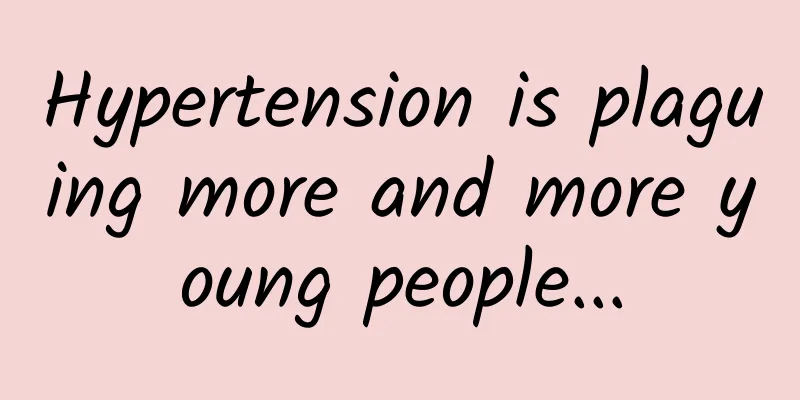Hypertension is plaguing more and more young people...

|
When talking about patients with hypertension, the first thing that comes to mind is the middle-aged and elderly, but the reality is that hypertension is besieging more and more young people. The study found that between 1991 and 2015, the relative increase rate of hypertension was highest among young people aged 18 to 39, reaching 5.4%, which is twice that of people aged 40 to 59 and more than ten times that of people aged 60 and above [1]. The Affiliated Hospital of North China University of Technology observed 7,100 employees with normal blood pressure, with an average age of 25, and found that only 27.06% of them still maintained normal blood pressure over an average period of less than 8 years. [2] Why is it so difficult to keep blood pressure normal? What affects blood pressure in young people? Image source: unsplash.com Photographer: SujeethPotla Multiple lifestyle factors increase the risk of high blood pressure Hypertension, a chronic disease closely related to our daily lifestyle, is being affected by multiple life factors, making contemporary young people face a higher risk of disease. First, changes in diet play an important role. In today's society, high-salt, high-fat diets have gradually become a common occurrence on many people's tables. Research data shows that the average salt content in Asian diets is higher than that in Western diets. This excessive salt intake has been recognized by the scientific community as one of the key causes of hypertension. A high-fat diet may contribute to weight gain, providing a "soil" for hypertension. A study conducted by North China University of Technology further confirmed this view. The study found that young people who adhered to a low-salt diet had a 25% higher chance of maintaining normal blood pressure after eight years, while those who maintained a standard weight had a 19% higher chance [2]. Secondly, the modern fast-paced lifestyle is also to blame. As the pace of society accelerates, more and more young people are immersed in busy work, lack regular exercise, and staying up late and staring at screens for long periods of time have become the norm. In addition, tobacco and alcohol consumption have been shown to be significantly associated with the incidence of hypertension [3]. Furthermore, genetic factors cannot be ignored. Studies have shown that if there is a history of hypertension in the family, the risk of the next generation developing the disease will increase significantly [4]. This is especially true when these young people are also exposed to other risk factors, such as smoking, drinking, or a high-salt diet. Finally, the environment we live in also quietly affects our health. Work pressure, environmental pollution, noise, etc. may have a negative impact on people’s blood pressure. Especially in highly urbanized areas, the prevalence of hypertension has increased due to the increase in environmental pressure [1]. Image source: unsplash.com Photographer: MufidMajnun Preventing high blood pressure The details in daily life determine success or failure Preventing high blood pressure does not only rely on the doctor's advice, but more on the choices and habits of each of us in our daily lives. There are corresponding preventive measures for the above risk factors. First, a low-salt, low-fat diet should be promoted, and the intake of vegetables and fruits should be increased. For example, the DASH diet and the Mediterranean diet both emphasize the intake of more whole grains, vegetables, and fruits, while reducing the intake of red meat, sugar, and sugary drinks. These dietary habits have shown positive effects on lowering blood pressure in many studies. [5] For people with high blood pressure, it is recommended to choose potassium-containing salts, which can help control blood pressure and even lower blood pressure in patients with high blood pressure. Studies have found that oral supplementation of 6 to 250 mmol/day (0.23 to 9.7 g/day) of potassium for 4 to 52 weeks can reduce systolic blood pressure by 3.5 to 9.5 mmHg and diastolic blood pressure by 2 to 6.4 mmHg. [6] Secondly, good exercise habits are also important. It is recommended that adults should perform moderate to vigorous aerobic exercise at least 4 times a week, for an average of 40 minutes each time, to lower blood pressure. By controlling weight through diet + exercise, a weight loss of about 10 kg may reduce systolic blood pressure by 5 to 20 mmHg. [5] Furthermore, mental health is equally important. Relaxation techniques such as tai chi, yoga, and meditation can help people reduce stress, which can have a positive impact on blood pressure [5]. In addition, avoiding smoking, limiting alcohol intake, and regularly self-monitoring blood pressure are also important measures to prevent hypertension. Finally, regular physical examinations are another key to preventing high blood pressure. This can not only help us detect and prevent potential health problems in a timely manner, but also ensure that our lifestyle and eating habits are on the right track. People at high risk of high blood pressure (older people and/or those with a family history of high blood pressure) should maintain the habit of regularly monitoring their blood pressure. It is recommended to measure blood pressure in the morning and evening every day. Each measurement should be taken 2 to 3 times, with a 1-minute interval, after sitting and resting for 5 minutes. [7] In short, to prevent high blood pressure, we need to start from every little detail in life. Only in this way can we truly "prepare for a rainy day" and stay away from the troubles of high blood pressure. Image source: unsplash.com Photographer: MufidMajnun Hypertension medication Seek medical attention promptly and adhere to treatment If the average blood pressure is ≥135/85 mmHg when you measure your blood pressure at home for the first time, you should consider the possibility of hypertension[7] and go to the hospital for a follow-up visit in time to determine the treatment plan and stick to it for a long time. If your blood pressure is found to be 180/120 mmHg or higher and you experience any of the following symptoms, please seek medical attention immediately or call 120 for medical help[8]: Hypertensive patients should maintain good monitoring habits. For patients at the initial diagnosis or in the early stages of treatment, or for patients whose blood pressure has not yet reached the target despite treatment, blood pressure should be measured continuously for 5 to 7 days before seeing a doctor. When blood pressure is well controlled, blood pressure should be measured at least once a week[7]. Nowadays, high blood pressure is not just a problem for the elderly. With the pressure of modern life and unhealthy lifestyles, more and more young people are also threatened by it. We call on all young people to pay attention to the problem of high blood pressure. From now on, let us work together to prevent it and protect our healthy future. References [1]YiQ,ZhaM,YangQ,etal.Trends in theprevalence of hypertensionaccordingtoseverityandphenotypeinChineseadultsovertwodecades(1991-2015).JClinHypertens(Greenwich).2021;23(7):1302-1315. [2]LiM,ZhaoL,ZhangL,etal.Factorsinfluencingnormalbloodpressuremaintenanceinyoungadults. JClinHypertens(Greenwich).2023;25(8):725-736. [3]MeherM,PradhanS,PradhanSR.RiskFactorsAssociatedWithHypertensioninYoungAdults:ASystematicReview.Cureus.2023;15(4):e37467. [4]ChengW,DuY,ZhangQ,etal.Age-relatedchangesintheriskofhighbloodpressure.FrontCardiovascMed.2022;9:939103. [5]VermaN,Rastogi S,ChiaYC,etal.Non-pharmacologicalmanagementofhypertension.JClinHypertens(Greenwich).2021;23(7):1275-1283. [6]IqbalS,KlammerN,EkmekciogluC.TheEffectofElectrolytesonBloodPressure:ABriefSummaryofMeta-Analyses. Nutrients.2019;11(6):1362. [7] China Hypertension League "Home Blood Pressure Monitoring Guidelines" Committee. 2019 China Home Blood Pressure Monitoring Guidelines. Chinese Journal of Circulation. 2019;34(7):635-639. Author: Jiang Yongyuan, Internal Medicine Doctor Reviewer: Tang Qin, Director and Researcher of the Science Popularization Department of the Chinese Medical Association |
<<: Popular Science Illustrations | Exploring the Hard Technology Behind Weather Modification
>>: 3 wrong breakfast combinations, how long have you been eating like this?
Recommend
How to quickly become a Tik Tok content operator
Friends who use Tik Tok know that video content i...
It’s time to learn the strategies for attracting new customers in the data age!
There are two kinds of problems in this world. On...
Emergency flood discharge at dawn! Extremely heavy rainstorm hits Shenzhen, please take precautions!
Typhoon Haikui landed in Taiwan, Fujian and Guang...
How convenient would it be to use robots to take care of you after retirement?
On September 13, the decision to gradually delay ...
If you have posted these five types of photos, please delete them immediately!
Recently, the topic **#Don't post 5 kinds of ...
VMplay Ai Qiwei: The era of free app downloads is coming
In this era of app proliferation, have you ever t...
What's new with AeroGear in Windows 10
Windows 10 1st preview has been released for a lo...
Changes in NCAP rating standards force changes in automotive technology
NCAP—New Car Assessment Program, by simulating var...
Revealing the secrets of second-hand new phone dealers: Xiaomi and Apple are the most popular
As the autumn rains come, the weather gets colder...
Four satellites in one rocket! Kuaizhou-1 has a good start! Tianmu-1 constellation phase networking is complete!
At 19:20 on January 5, 2024, the Kuaizhou-1A soli...
The legendary snail that disappeared for a century reappears in the world!
Recently, Chinese researchers discovered sessile ...
The secret of Tencent Video’s advertising materials to achieve high volume
The author recently met a friend in the same indu...
You only need to join WiFi to make calls. The call version of "Fetion" may make a comeback
Although the domestic communication and social en...
What does the "how" in Baidu bidding mean? How to modify the title of Baidu bidding method?
How to apply for Baidu Xijing? Can a general acco...
Low sodium salt, non-iodized salt, iodized salt... What are the differences between various salts?
This article was reviewed by Li Lin, PhD in Food ...




![Wang Sai [Master Class] Elementary School Chinese Reading Score Improvement Class Advanced](/upload/images/67cc07f5f2f6c.webp)




